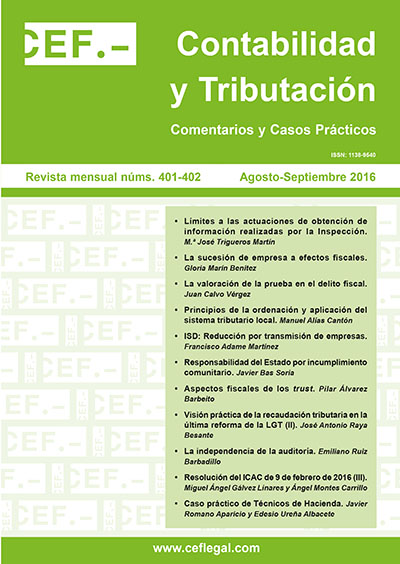Regulación frente a reputación como medio de salvaguardar la independencia de la auditoría
DOI:
https://doi.org/10.51302/rcyt.2016.4735Palabras clave:
independencia, regulación, competencia del mercadoResumen
Este trabajo ha obtenido el 1.er Premio Estudios Financieros 2016 en la modalidad de Contabilidad y Administración de Empresas.
La existencia de determinados fraudes informativos cometidos por las empresas pone de manifiesto que la exigencia legal del auditor de actuar de forma independiente puede ser cuestionada en algunas ocasiones. Ello se debe a que durante el proceso de auditoría pueden darse situaciones que crean amenazas para que el auditor actúe con el nivel de independencia requerido legalmente y deseable socialmente. Entre las situaciones que pueden tener un mayor efecto negativo en la independencia del auditor y que mayor preocupación han generado entre los organismos reguladores se ha resaltado el «riesgo de dependencia económica», es decir, las amenazas sobre la independencia que provienen de las rentas que los auditores obtienen de sus clientes. Ante la existencia de este riesgo se ha propuesto un modelo de regulación en el que se pretende fundamentalmente reducir las rentas económicas que los auditores obtienen. No obstante, estas normas no han recibido el apoyo unánime de la doctrina cuestionándose por un lado su eficiencia, es decir, la posibilidad de que generen más costes que beneficios, y por otro lado su necesidad cuando el mercado ya genera suficientes incentivos a los auditores para ser independientes. En este sentido, los objetivos de este estudio son proveer evidencia empírica para el caso español de ambas críticas sobre la regulación de la independencia.
Descargas
Citas
American Institute of Certified Public Accountants [1978]: The Commission on Auditors' Responsibilities: Report, Conclusions and Recommendations, Cohen Commission, AICPA, New York.
Arruñada, B. y Paz-Ares, C. [1997]: «Mandatory rotation of company auditors: A critical examination», International Review of Law and Economics, vol. 17, págs. 31-61.
Balgati, B. [2001]: The Econometric Analysis of Panel Data, 2nd ed. John Wiley & Sons: Chichester.
Carcello, J. V. y Nagy, A. [2004]: «Audit firm tenure and fraudulent financial reporting», Auditing: A Journal of Practice & Theory, 23(2), págs. 55-69.
Craswell, A. T. [1988]: «The association between qualified opinions and auditor switches», Accounting and Business Research 19(73), págs. 23-31.
DeAngelo, L. E. [1981a]: «Auditor independence, "low balling", and disclosure regulation», Journal of Accounting and Economics, vol. 3, n.º 2, págs. 113-127.
DeAngelo, L. E. [1981b]: «Auditor size and audit quality», Journal of Accounting and Economics, vol. 3, n.º 3, págs. 183-199.
DeFond, M. L. y Francis, J. R. [2005]: «Audit Research after Sarbanes-Oxley», Auditing: A Journal of Practice &Theory, vol. 24, págs. 5-30.
DeFond, M.; Raghunandan, K. y Subramanyan, K. [2002]: «Do non-audit services fees impair auditor independence? Evidence from going concern audit opinions», Journal of Accounting Research, vol. 40, págs. 1.247-1.274.
Deis, D. R. Jr. y Giroux, G. A. [1992]: «Determinants of audit quality in the public sector», The Accounting Review, 67(3), págs. 462-479.
Dye, R. A. [1991]: «Informationally motivated auditor replacement», Journal of Accounting and Economics, 14, págs. 347-374.
Francis, J. [2011]: «A Framework for Understanding and Researching Audit Quality», Auditing: A Journal of Practice & Theory, 30(2), págs. 125-152.
Francis, J. R. y Krishnan, J. [2002]: «Evidence on auditor risk-management strategies before and after the Private Securities Litigation Reform Act of 1995», Asia Pacific Journal of Accounting and Economics, 9, págs. 135-157.
Francis, J. R.; Reichelt, K. y Wang, D. [2005]: «The pricing of national and city specific reputation for Industry expertise in the US audit market», The Accounting Review, 80 (enero), págs. 113-136.
Geiger, M.; Raghunandan, K. y Rama, D. V. [1998]: «Costs associated with going-concern modified audit opinions: An analysis of auditor changes, subsequent opinions, and client failures», Advances in Accounting, 16, págs. 117-139.
Geiger, M. y Raghunandan, K. [2002]: «Auditor tenure and audit reporting failures». Auditing: A Journal of Practice & Theory, 21(1), págs. 68-78.
Johnstone, K. M.; Sutton, M. H. y Warfield, T. D. [2001]: «Antecedents and consequences of independence risk: Framework for analysis», Accounting Horizons, 15(1), págs. 1-18.
Krishnan, J. y Krishnan, J. [1996]: «The role of economic tradeoffs in the audit opinion decision: An empirical analysis», Journal of Accounting, Auditing, & Finance 11(4), págs. 565-586.
Lennox, C. S. [2000]: «Do companies successfully engage in opinion-shopping? Evidence from the UK», Journal of Accounting and Economics, 29, págs. 321-337.
Mautz, R. K. y Sharaf, H.A. [1961]: Philosophy of Auditing, Monograph, n.º 6, Evanston, IL, American Accounting Association, Sarasota.
McKeown, J.; Mutchler, J. y Hopwood, W. [1991]: «Towards an Explanation of Auditor Failure to Modify the Audit Opinions of Bankrupt Companies», Auditing: A Journal of Practice & Theory, Supplement.
Monterrey, J. y Sánchez-Segura, A. [2007]: «Rotación y dependencia económica de los auditores: sus efectos sobre la calidad del resultado en las compañías cotizadas españolas», Investigaciones Económicas, vol. 31, n.º 1, págs. 119-159.
Reynolds, J. K. y Francis, J. R. [2001]: «Does size matter? The influence of large clients on office-level auditor reporting decisions», Journal of Accounting and Economics, 30(3), págs. 375-400.
Romano, R. [2005]: «The Sarbanes-Oxley Act and the Making of Quack Corporate Governance», The Yale Law Journal, vol. 114, págs. 1.521-611.
Simunic, D. y Stein, M. [1987]: Product Differentiation in Auditing: Auditor Choice in the Market for Unseasoned New Issues, The Canadian Certified Accountants' Research Foundations, Vancouver.
Teoh, S. H. [1992]: «Auditor independence, dismissal threats, and the market reaction to auditor switches». Journal of Accounting Research 30(1), págs. 1-23.
Wallman, S. M. H. [1996]: «The future of accounting, part III: Reliability and auditor independence». Accounting Horizons, 10 (diciembre), págs. 76-97.
Zmijewski, M. [1984]: «Methodological issues related to the estimation of financial distress prediction models». Journal of Accounting Research (suplemento), págs. 59-82.















